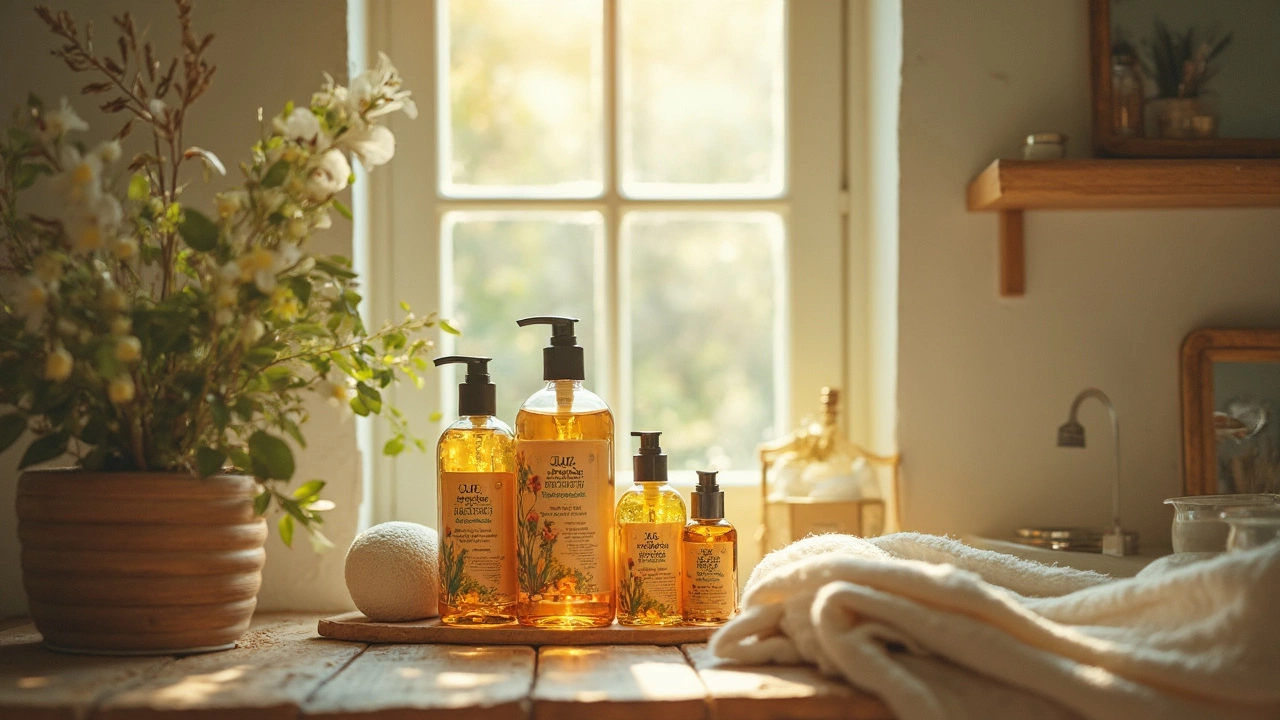What's Healthiest for Your Hair?
 Feb, 16 2025
Feb, 16 2025
Ever stood in the hair care aisle, overwhelmed by the sheer number of products promising miracles? You're not alone. Choosing what's genuinely healthy for your hair can feel like solving a puzzle. But fear not! We’re breaking it down with clear, practical advice.
First, let's talk about those ingredients. Next time you're holding a shampoo bottle, flip it over and take a peek at the list. Ever heard of sulfates? These are common in shampoos for their lathering effect, but they can be harsh and strip your hair of its natural oils. Going sulfate-free might be a small change, but it’s often a big win for hair health.
The Role of Ingredients
When it comes to maintaining hair health, ingredients play a crucial role. It's easy to be swayed by glossy advertisements and catchy phrases, but knowing what's inside those bottles makes all the difference.
Sulfates and Parabens
Sulfates, often found in shampoos, help create that satisfying lather. But there's a catch: they can be drying and irritating for some folks, especially if you’ve got sensitive skin or dyed hair. Parabens, used as preservatives, have raised concerns due to their potential hormone-disrupting effects. Opting for products labeled as sulfate-free and paraben-free could be a game-changer for your hair’s texture and overall health.
Silicones
Love that smooth feel your conditioner gives? Thank the silicones. These synthetic compounds coat your hair, reducing frizz and adding shine. However, over time, they can build up, weighing your hair down and making it harder to style. Consider switching to products with natural oils for a similar effect without the downside.
The Good Stuff: Natural Oils
Ever tried coconut oil? It’s a fantastic multitasker, known not just for adding moisture but battling dandruff, too. Argan oil is another popular pick; it’s great for nourishment and heat protection. Check labels for these gems, as they’re often highlighted in the list of ingredients for their numerous benefits.
What About Alcohols?
Not all alcohols in hair products are drying. While short-chain alcohols like ethanol can strip moisture, fatty alcohols like cetyl or stearyl alcohol actually help lock it in. They are often found in conditioners to enhance texture and shine.
As you analyze product labels, don't be intimidated by those long chemical names. With a little know-how, you can sift through the buzzwords and pick what's truly beneficial for your hair type and needs. Here’s a straightforward tip: prioritize short, natural ingredient lists as they are generally safer bets for achieving healthy, vibrant hair.
Nourishing Oils
Oils can be your hair's best friend, especially if you're figuring out the secret to healthy hair. They add shine, lock in moisture, and can even protect against damage. But not all oils are created equal.
Argan Oil
Argan oil is often dubbed 'liquid gold'. Why? Because it's packed with fatty acids, vitamin E, and antioxidants. It can deeply nourish and smoothen out frizz, making it a go-to for sleek locks. A few drops after washing can do wonders!
Coconut Oil
Another favorite is coconut oil. Less is more here, especially if your hair tends to be oily. It's brilliant for deep conditioning. Apply a small amount overnight, and you'll wake up with soft, shiny hair. Just don't go overboard—too much can weigh your hair down.
Jojoba Oil
Jojoba oil mimics the natural sebum of your scalp, making it excellent for balancing out moisture. This is especially handy if you’re dealing with a dry scalp. A little applied directly to the roots can maintain your natural oils without leaving any greasy aftermath.
Olive Oil
Olive oil isn't just for the kitchen. It's a heavy-duty conditioner. Rich in vitamins A and E, olive oil can help repair damaged ends. Consider it a deep-conditioning treat once a week.
Quick Tips
- Start with a small amount of oil and add more if needed.
- Warm the oil slightly for better absorption.
- Use a comb to distribute evenly through your hair.
Oh, and if you're into stats, a recent survey discovered that 60% of people noticed significant improvement in hair texture after incorporating oils into their routine. That's something to think about if you're on the fence about oils.

Impact of Diet
Believe it or not, what you eat can directly affect the health of your hair. It's true! Hair needs certain nutrients to grow strong and healthy. Without the right balance of protein, vitamins, and minerals in your diet, your hair can become weak, brittle, or even start falling out.
Protein Power
Our hair is primarily made up of a protein called keratin. If you're not consuming enough protein-rich foods, your hair might not have the building blocks it needs to grow properly. Think about adding more eggs, nuts, fish, and beans to your meals to keep your hair strong.
Vitamins and Minerals
Let's not forget the vitamins and minerals. Vitamin A helps produce healthy sebum to moisturize the scalp. Foods like carrots and spinach are great sources. Biotin, a B vitamin, is also crucial for hair health and can be found in eggs, almonds, and avocados. Meanwhile, iron and zinc are essential for follicle health, so consider adding some beef or lentils to your plate.
“A lack of essential nutrients can impact hair health just like any other system in the body.” - Dr. Jane Parker, Nutritionist
Here's a fun fact for you: Studies have found that iron deficiency is one of the most common nutritional causes of hair loss. Hair nutrition is not just a trendy term, it's a reality.
Hydration is Key
Water, water, water! Staying hydrated is crucial for every part of your body, and your hair is no exception. Lack of hydration can make your hair shaft dry and brittle, leading to breakage. So, always remember to drink plenty of water throughout the day.
So, next time you think about skipping breakfast or reaching for that bag of chips, remember your hair will thank you for choosing a nutrient-packed snack. Small changes can make a big difference in the health of your hair.
Common Pitfalls
Taking care of our hair seems straightforward, but some mistakes can sneak in without us realizing. So, what are the traps to watch out for on our journey to healthier hair?
Too Much Heatin'
Let's face it—many of us can't resist the allure of sleek, straightened strands or those effortless-looking curls. But frequent use of high heat tools can lead to serious damage. Did you know that exposure to temperatures above 392°F (200°C) can weaken hair's structure? Try limiting the use of heat tools to a couple of times a week, and always use a heat protectant.
Over-Washing Woes
Washing your hair every day might seem like a good idea, especially if it gets greasy quickly. However, this habit can strip away those essential oils that naturally nourish and protect your hair and scalp. Instead, aim to wash your hair 2-3 times a week. It's more about quality than frequency.
Ignoring the Scalp
Your scalp is the foundation of healthy hair. It's easy to overlook, but a well-cared-for scalp leads to better hair growth and reduced hair loss. Incorporate gentle scalp massages during your wash routine or even consider a weekly scalp mask.
The Wrong Products
Using products not suited for your hair type can cause more harm than good. If you have dry hair, opt for moisturizing products. For oily hair types, consider lightweight formulas. Checking product labels and understanding key ingredients can have a significant impact.
| Common Mistake | Result | Solution |
|---|---|---|
| Excessive Heat Styling | Damaged Hair | Use Heat Protectant + Reduce Frequency |
| Daily Washing | Dry and Brittle Hair | Wash 2-3 times per week |
| Neglecting Scalp Care | Poor Hair Growth | Scalp Massage + Weekly Mask |
| Choosing Wrong Products | No Improvement | Match with Hair Type |
Avoiding these pitfalls could make all the difference and help bring out your hair's natural shine and strength. Remember, healthy hair is all about making informed choices that suit your unique needs.
